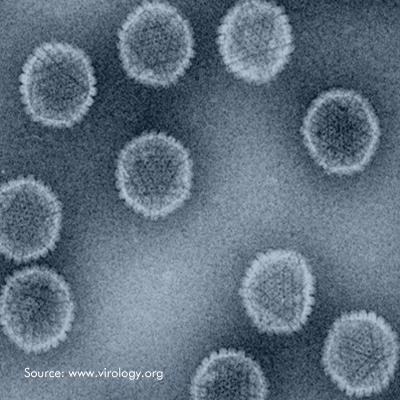IZS - Istituto Zooprofilattico Sperimentale Abruzzo e Molise
EHV 1 Neurological Outbreak at CES Valencia Spring Tour (Spain)

- Figure 1. Equine herpesvirus type 1 (source: www.virology.org)
Following the reporting of multiple cases of neurological forms attributed to the Herpes Equine Virus (EHV) type 1, in horses that participated in the CES Valencia Spring Tour (Spain), the International Equestrian Federation (FEI) has canceled all events international in 10 European countries with immediate effect from 1 March until 28 March 2021.
Other cases with symptoms referable to EHV-1 have been reported in various countries, where horses that had participated in the Valencia event have returned, and laboratory investigations are underway for these.
The FEI continues to update the information in this regard through press releases available on the following link https://inside.fei.org/fei/your-role/veterinarians/biosecurity-movements/biosecurity .
The Italian Federation of Equestrian Sports (FISE) consequently ordered with an urgent resolution, to suspend as a precaution the national sporting events of any level and discipline scheduled until 7 March, to allow an assessment of the situation with the health authorities. national and international and to monitor the epidemiological trend in Italy.
Continuous updates will be disseminated by the FISE.
The Ministry of Health also immediately took action to acquire information for the containment of the infection at a national level and will issue updates on the matter.
EHV-1 is an infection of equines, not transmissible to humans, which causes various clinical forms:
- respiratory with cough and nasal discharge
- paralytic with decreased coordination of the hindquarters, and occasionally also of the foreleg, urine dribbling, fever, hind limb weakness, leaning against things to maintain balance, lethargy and the inability to get off the ground
- Abortion usually occurs in the last four months of gestation, two to four weeks after infection of the mare. Perinatal (around the time of birth) infection can lead to pneumonia and death. Encephalitis can occur in affected animals, leading to ataxia, paralysis, and death.
Fever is the most common clinical sign of EHV-1, some horses that appear perfectly healthy can still spread the virus from nostril secretions also from secretions from coughing.
Suspicious horses are those that:
- have had direct or indirect contact with the CES Valencia Spring Tour sporting event (Spain);
- have had a feverish rise
- present one or more symptoms of the forms described above, even if not did not had a feverish rise.
Measures to be taken in case of a suspicion:
- Immediate isolation of the horse and the adoption of biosecurity measures to prevent the spread of infection;
- Inform the competent official veterinarians of the area;
- start a supportive treatment under the supervision of the veterinarian;
- Carry out nasal swabs for diagnostic investigations. Nasal swabs should be deep and made to both nostrils. In the event of an abortion, the fetus and fetal envelopes must be sent.
Materials and methods for providing diagnostic samples
It is important that diagnostic samples are delivered to the laboratory as soon as possible after collection, and stored at refrigeration (+ 4 ° C) or freezing (-20 ° C) temperatures during their transport.
Nasal swabs can be delivered dry (within 4 hours of their collection) or immersed in 1ml -1.5ml of virological transport media (e.g. sterile buffered solution or saline).
Positive samples can be sent to the National Reference Center for Equine Diseases for further diagnostic studies at the addresses below.
For more information on sample collection and how to deliver them to the laboratory, please contact:
- Istituto Zooprofilattico Sperimentale del Lazio e della Toscana M. Aleandri – via Appia Nuova, 1411 – 00178 Roma
- Unità Operativa Virologia – Centro di Referenza Nazionale per le Malattie degli Equini
0679099353/449, cerme@izslt.it
Source : IZSLT